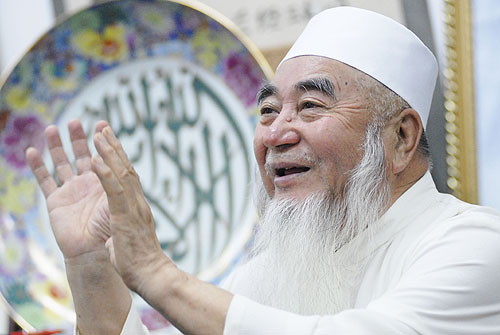|
 |
|
Xue Tianli, imam of the Niujie Mosque (WEI YAO) |
July 24 was a typical Friday at Niujie Mosque, Beijing's oldest and largest house of prayer for Muslims. At 12:45 p.m. the muezzin, a caller who beckons followers of Islam in the vicinity to come and pray, stood on top of the mosque's minaret and summoned all for Jumu'ah, a congregational prayer held every Friday.
When prayers began at 1:30 p.m., more than 1,000 people dropped to their knees inside the mosque. Another 100 people who came late took a place on carpets or mats laid down in the sanctuary's yard.
With 10,000 Muslims, Niujie, in southern Beijing, is home to the city's largest Muslim community. The community is mainly comprised of the Hui people. The Niujie Mosque, which was first built in 996 and covers an area of 10,000 square meters, is surrounded by Muslim food markets, restaurants, schools, kindergartens and nursing homes.
In 2005, the government spent 25 million yuan ($3.6 million) to renovate the mosque and preserve its grand buildings. Listed as a cultural heritage site for state-level protection, the sanctuary also has tombs containing two Arabic sages who came to China to spread Islam during the 13th century.
It was the third time Gasba Shu'aibu Dakats, a Nigerian radio editor in Beijing, prayed in Niujie. He said he appreciated the architecture for its combination of Chinese and Islamic cultures. Dakats also admires the harmonious atmosphere of people of various skin colors and from various countries praying together at the holy building. "I come from a different part of the world. I come to meet Chinese Muslims, African Muslims and Afghan Muslims. We are all brothers and sisters," he said.
As the mosque's growing fame attracts more foreign worshippers, Xue Tianli, its imam, said young Muslims from other parts of the country who open or work in restaurants and stores in the neighborhood are also coming to pray in larger numbers. Most are from China's northwest Qinghai Province and the Ningxia Hui and Xinjiang Uygur autonomous regions. Wei Chunjie, Deputy Director of the mosque's administration committee, said nearly 200 Uygur Muslims take part in the Jumu'ah prayer every week.
The 76-year-old Xue, a member of the Hui ethnic group, said the young Uygurs are just as respectful to him as other worshippers. Speaking of the July 5 Urumqi riot, in which 197 people were killed, Xue said Muslims who committed violence during the riot cannot be forgiven according to Islamic teachings.
"They are to be punished by the law as well as by Allah," Xue said.
Liu Shoupeng, 68, has prayed there since childhood. The retired engineer said although some Uygur worshippers are unable to speak Mandarin well, they have no difficulty understanding each other. Liu said he often dines with Muslims from different ethnic groups at the same table during mosque-organized banquets for the Festival of Fast-breaking.
New Policies in Xinjiang
Nur Berkri, Chairman of the Xinjiang regional government, said during the 12th meeting of the 11th Standing Committee of the Xinjiang Regional People's Congress, that safeguarding the ethnic unity damaged by the July 5 riot in Xinjiang Uygur Autonomous Region is a fundamental task of the government.
Governments at all levels must promote education on national unity and laws, especially among the younger generation, farmers and herdsmen, floating populations and religious groups, he said. Officials should better understand what the public needs, especially people in poverty, while more attention should be paid to providing psychological assistance to victims and encouraging them to rebuild their homes, he added.
The meeting, which concluded on July 24, passed a resolution to crack down on violent crimes while also safeguarding ethnic unity and social stability.
The resolution stated that separatist, terrorist and extremist forces led by Rebiya Kadeer masterminded the riot, which was aimed at fomenting hostility, destroying stability and splitting the nation.
Eligen Imibakhi, Chairman of the Standing Committee of the Xinjiang Regional People's Congress, said many ethnic minorities protected and rescued the Han people despite concerns for their own safety during the riot. Their acts proved goodwill could withstand any serious tests, he said, while he also urged the public not to believe or spread rumors but to fight against activities that inflict damages to ethnic unity.
The regional legislature plans to create regulations concerning ethnic unity education and the rules concerning anti-separatism. The regulations on public security and religious affairs will also be revised, he said.
(Source: Xinhua) | 